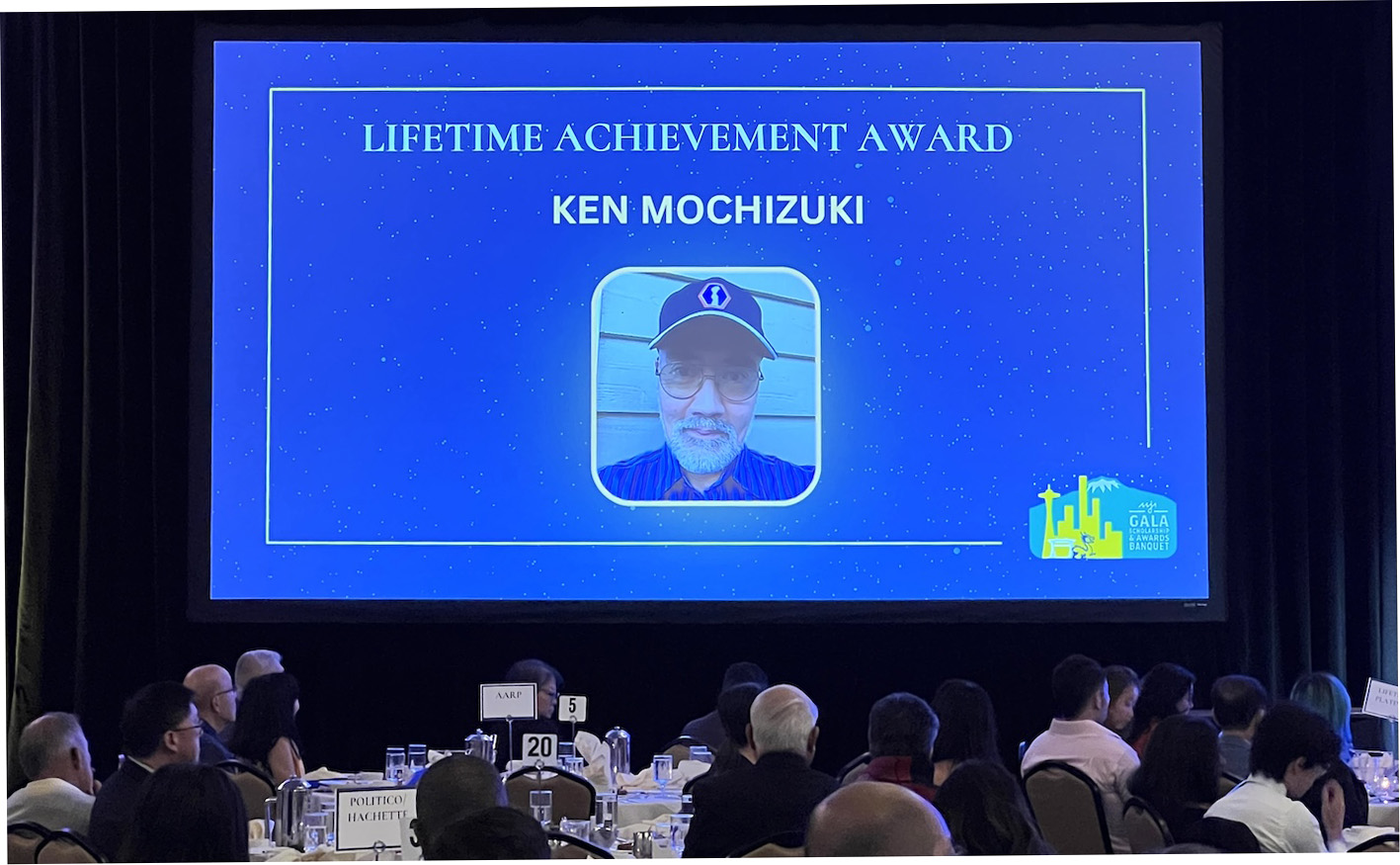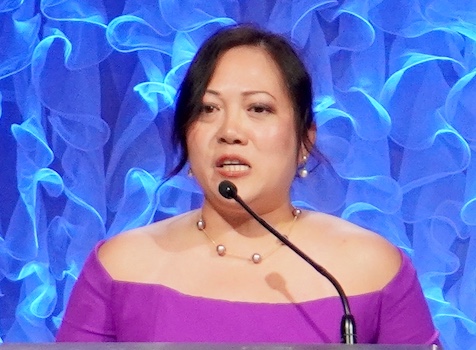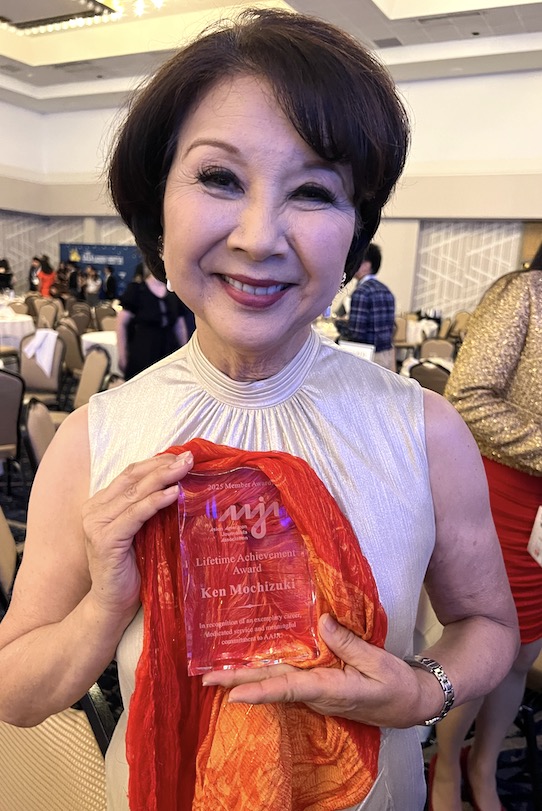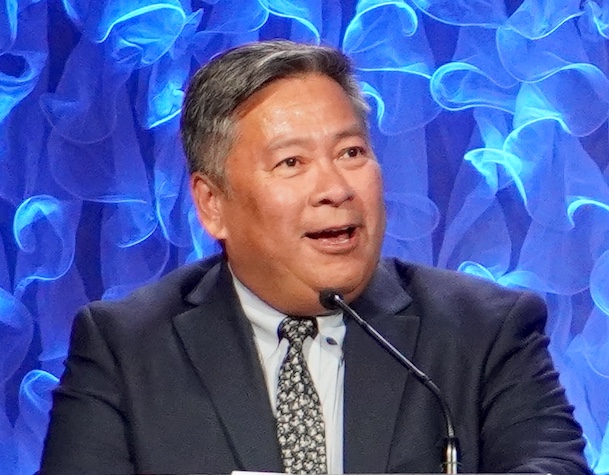
when he was presented the Lifetime Achievement Award in absentia. (Photo: George Toshio Johnston)
Seattle’s Ken Mochizuki, Rose Tibayan get Lifetime Achievement recognition at the 2025 convention.
By George Toshio Johnston, P.C. Senior Editor
The Asian American Journalists Assn.’s national convention ended the awards presentation of its well-attended gala, held on Aug. 2 in the Sheraton Grand Seattle’s Grand Ballroom in Seattle, on a poignant note with its two Lifetime Achievement Awards. One went to a still-living recipient who was unable to attend because of esophageal cancer; the other was received posthumously by a surviving spouse, also because of cancer.
On hand to receive the prize for Ken Mochizuki was his friend, former TV newscaster Lori Matsukawa, followed by widower Don Villar, secretary-treasurer of the Chicago Federation of Labor, present to accept the award on behalf of his late wife, Rose Eileen Flores Tibayan. Both recipients in their own way represented AAJA25’s convention theme, “Forging Our Legacies.”

AAJA Executive Director Naomi Tacuyan Underwood (Photo: George Toshio Johnston)
In her preface to the Lifetime Achievement Awards, AAJA Executive Director Naomi Tacuyan Underwood explained, “Our association’s highest honor, the AAJA’s Lifetime Achievement Award, isn’t simply a recognition of time. It’s a tribute to perseverance, vision, integrity and impact. It’s about individuals whose . . . influence will be felt for generations to come.”
Matsukawa, who retired in 2019 after her long career as a news anchor on Seattle’s NBC affiliate KING, echoed that sentiment in a postconvention interview with Pacific Citizen about Mochizuki. “His reaction to receiving the award has just been amazing,” she said. “When he first heard that he was going to receive the award, he couldn’t believe it. He says, ‘Well, you know, AAJA hardly knows me.’”
Turns out AAJA did know who Mochizuki was — he was, after all, the first member of AAJA’s Seattle chapter to serve as its treasurer and later as its president.

Using her scarf as a backdrop to show the wording on Ken Mochizuki’s transparent Lifetime Achievement Award is Lori Matsukawa, who accepted the award on his behalf.
Matsukawa conveyed Mochizuki’s acceptance speech on his behalf. “I wish I were there with you, since I was there when AAJA was born. But esophageal cancer has won today’s battle, though it hasn’t won the war,” she said, reading his words.
Mochizuki, whose vocations and avocations spanned acting in film and on TV and stage, TV news production and print journalism, most notably for Seattle’s International Examiner, also made his mark as an author, having penned the novel “Beacon Hill Boys,” which became an indie film.
But it was writing books for children and young adults where Mochizuki made his biggest splash, with 1993’s award-winning “Baseball Saved Us” (illustrated by Dom Lee) — about how the game helped a young boy endure life in a World War II concentration camp for Japanese Americans — having become a perennial favorite to the present day, with more than 600,000 copies sold to date.
Perplexingly, the free expression advocacy nonprofit PEN America reported in an article from early 2025 titled “The 23 Most Banned Picture Books of the 2023-2024 School Year” that “Baseball Saved Us” was among the books tied for fifth place on that list.
The gala’s other Lifetime Achievement Award went to Tibayan, who before her June 2024 death following a 14-monthlong battle with cancer had served as the director of public affairs for Chicago’s Department of Budget, Management and Finance. Prior to that she had earned her master’s degree in journalism from Columbia University before working as an award-winning broadcast journalist in Guam, Fort Myers, N.J., Philadelphia, San Francisco and Milwaukee. The Chicago AAJA chapter has since created the Rose Tibayan Scholarship Fund in her honor.

Don Villar accepted the AAJA Lifetime Achievement Award on behalf of his late wife, Rose Tibayan.
Of this late wife, Villar said, “Everybody loved Rose. There was just something about her. And even press corps loved her because they knew if they had a question, they’d get a straight answer.”
In other recognitions, the AAJA Visibility Award went to Lucy Liu, who was present and participated in a Q & A for the audience. Best-known for her roles in such movies as “Kill Bill,” “Charlie’s Angels,” “Chicago,” “Presence” and “Red One,” as well as such TV series as “Ally McBeal” and “Elementary,” Liu most recently starred in and produced “Rosemead,” which was inspired by a 2017 article written by former Los Angeles Times reporter Frank Shyong about a dying Asian immigrant woman who acted pre-emptively to prevent her mentally ill son from going down a path she believed would end in tragedy for others.
In other AAJA awards, the President’s Award went to Glenn and Karen Sugihara for their nearly four decades of service to the Asian American Journalists Assn., with Glenn serving as its accountant and chief financial officer and Karen serving as an accountant consultant.
Remaining awards and their recipients were:
- Leadership in Diversity & Solidarity: Weijia Jiang (senior White House correspondent, CBS News)
- AAPI Community Impact Award: Tayo, a project of the Filipino Young Leaders Program (FYLPRO)
- Community Impact Award: Documented, an independent, nonprofit newsroom
- Suzanne Ahn Civic Engagement & Social Justice Award: Josie Huang (Pasadena, Calif.-based public radio correspondent and host at LAist 89.3)
- AAJA-Medill Innovator Award: Ke “April” Xu
- Member of the Year: Annie Z. Yu
- Chapter of the Year: Chicago
- Affinity Group of the Year: Yung AAJA
- Changemaker of the Year: S. Mitra Kalita
- Mentor of the Year: Katherine Lewis
- Emerging Journalist of the Year: Stephanie Lai
Recognized for having died recently were K. W. Lee and Yasutsune “Tony” Hirashiki. To view the list of 2025 Journalism Excellence Award recipients, visit tinyurl.com/3a9a4dxa.
The next AAJA national convention will take place in Minneapolis, Minn., June 24-28, 2026.



